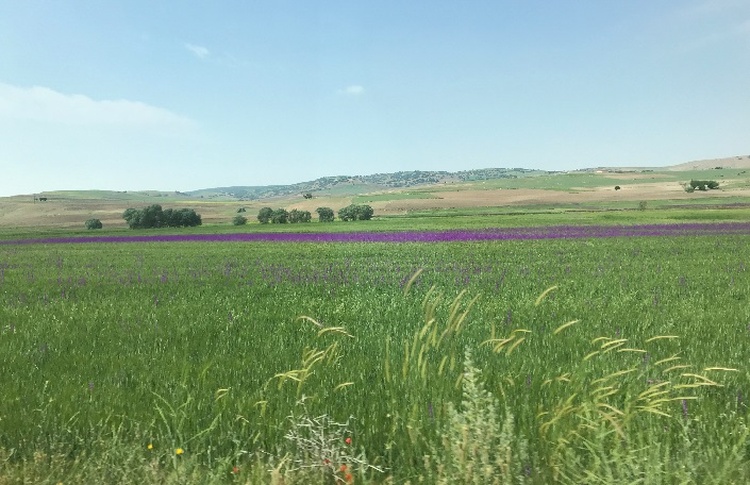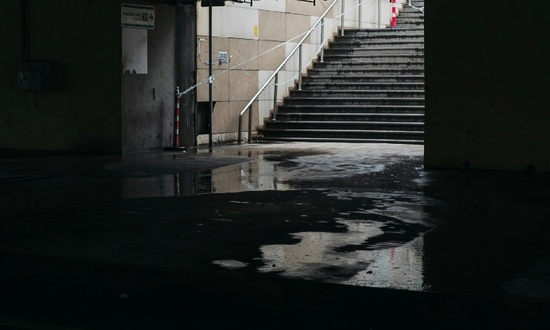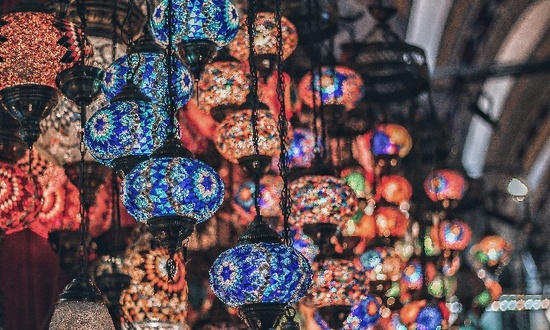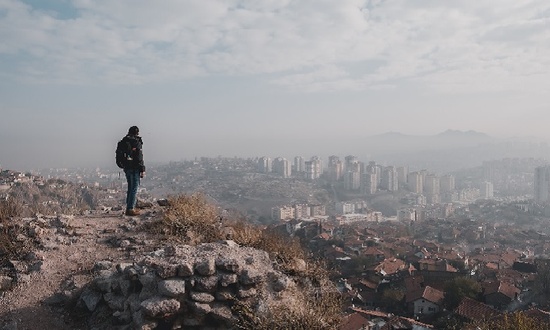Randy Alcorn
Batı dünyasındaki modern Hristiyanlar arasında şaşırtıcı bir şey gerçekleşti. Birçoğumuz alışkanlık olarak sanki sonsuz yaşam yokmuş gibi ya da bu hayatta yaptıklarımızın sonsuz yaşam üzerinde hiçbir etkisi yokmuş gibi düşünüyor ve böyle davranıyoruz.
Günümüzdeki yaygın tutum, adeta bu dünya bizim evimizmiş gibi (öteki dünya kimin umrunda ki?) sonsuz geleceğimize değil de şimdiki koşullarımıza odaklanmaktır. Oysa Kutsal Yazılar sonsuz geleceğimizin gerçekliğinin, söylediğimiz sözlere ve yaptığımız eylemlere kadar içinde bulunduğumuz yaşamın karakterine egemen olması ve onu belirlemesi gerektiğini belirtir (Yakup 2:12; 2. Petrus 3:11-12).
Bugün ve her gün kendimize "gerçek olanı" hatırlattığımızdan emin olalım. İşte hatırlamamız gereken altı sonsuz gerçek:
1. Sadece iki tane ebedi varış noktası vardır; Cennet veya Cehennem. Ben ve tanıdığım herkes ya birine gideceğiz ya da diğerine.
Dar kapıdan girin. Çünkü yıkıma götüren kapı geniş ve yol enlidir. Bu kapıdan girenler çoktur. Oysa yaşama götüren kapı dar, yol da çetindir. Bu yolu bulanlar azdır (Matta 7:13-14).
Cennet de Cehennem de dünyadan geçen, doğrudan birine ya da diğerine giden bir ara dünyadır. Dünyadaki en iyi yaşam cennetin; en kötü yaşam da cehennemin bir anlık görüntüsüdür. Hristiyanlar için şimdiki yaşam, Cehenneme en çok yaklaşacakları andır. İmanlı olmayanlar içinse, Cennete en çok yaklaşacakları andır.
Bu hayatta önümüzde duran seçimin gerçekliği hem muhteşemdir hem de korkunçtur. İki muhtemel varış noktasının kesinliği göz önüne alındığında, herkesin Cehennemden kaçınmak ve Cennete gitmek için herhangi bir bedel ödemeye istekli olması gerekmez mi? Ancak, bedel çoktan ödendi. “Bir bedel karşılığı satın alındınız” (1. Korintliler 6:20). Tanrı’nın Oğlu, İsa Mesih’in dökülen kanı ile ödenen bedel çok büyüktü.
Bunun mucizesini bir düşünün: Tanrı, biz olmadan Cennette olmaktansa, bizim yerimize Cehenneme gitmeyi tercih edeceğine karar vermiştir. Cehenneme gitmememizi o kadar çok istiyor ki, buna mecbur kalmayalım diye çarmıhta korkunç bir bedel ödedi.
Her yol Cennete götürmez. Sadece tek bir yol götürür: İsa Mesih. Şöyle demiştir, “Benim aracılığım olmadan Baba'ya kimse gelemez” (Yuhanna 14:6). Diğer tüm yollar Cehenneme götürür. Cehennem gerçeği yüreklerimizi dağlamalı, dizlerimizin üstüne çökmemizi sağlamalı ve bizi Mesih olmadan yaşayanların kapısına götürmelidir.
2. Bu dünya (şimdiki haliyle) benim evim değildir ve içindeki her şey yanacak, sadece ebedi olan kalacak.
O gün gökler büyük bir gürültüyle ortadan kalkacak, maddesel öğeler yanarak yok olacak, yer ve yeryüzünde yapılmış olan her şey yanıp tükenecek. Her şey böylece yok olacağına göre, sizin nasıl kişiler olmanız gerekir? Tanrı'nın gününü bekleyip o günün gelişini çabuklaştırarak kutsallık içinde yaşamalı, Tanrı yolunu izlemelisiniz (2. Petrus 3:10-12).
Dünya bizim günahımız yüzünden zarar görmüştür (Yaratılış 3:17). Bu nedenle, dünya şimdiki haliyle (lanetin altında) bizim evimiz değildir. Dünya geçmişte olduğu ve gelecekte de olacağı gibi bizim evimizdir. Bizler bu hayatta yolcularız, evimiz asla dünyada olmayacağı için değil, sonsuz evimiz şu anda dünyada olmadığı için. Öyleydi ve öyle de olacak, ama henüz değil.
Tanrı şu anki dünyanın ateş tarafından yok edileceğini söyler (2. Petrus 3:10). Pavlus, Tanrı’nın kutsallığının ateşinin tahta, ot ve kamıştan oluşan her ne yapmış olursak olalım, hepsini tüketeceğini söyler. Fakat bize ateşten kurtulup doğrudan yeni göklere ve yeni dünyaya ulaşacak olan bir şey olduğunu söyler. Bunlar altın, gümüş ve değerli taşlarla yapılmış olan işlerdir (1. Korintliler 3:12).
Sonsuza kadar sürecek olan nedir? Arabanız, eviniz, diplomalarınız, ödülleriniz ya da işiniz değildir. Sonsuza dek sürecek olan, ihtiyaç sahiplerine yapılan her hizmet, aç insanları doyurmak için bağışlanan paralar, susuzlara verilen her bir bardak soğuk su, hizmetlere yapılan her türlü yatırım, ihtiyaç sahipleri için edilen her dua, müjdecilik için harcanan her çaba ve değerli çocuklarla ilgilenilen her andır, buna onları sallayarak uyutmak ve bezlerini değiştirmek de dahildir. Kutsal Kitap bu hayatta ektiklerimizi sonsuzlukta biçeceğimizi söyler (Galatyalılar 6:7-8).
3. Bu hayattaki seçimlerim ve eylemlerim dünya ve gelecek yaşam üzerinde doğrudan bir etkiye sahiptir.
İşte tez geliyorum! Vereceğim ödüller yanımdadır. Herkese yaptığının karşılığını vereceğim (Vahiy 22:12).
Bu hayatta yaptıklarımız sonsuz önem taşır. Sizin ve benim, acı çeken bir ruha şifa vermek, cehennemden kurtulabilecek biriyle Mesih'i paylaşmak, hastalarla ilgilenmek, aç olanlara yemek vermek, ölmekte olanları teselli etmek, henüz doğmamış olanları kurtarmak, Kutsal Yazıları tercüme etmek, müjdeyi henüz ulaşılmamış bir halka ulaştırmak, Tanrı'nın egemenliğini ilerletmek, muhtaç olanlara evlerimizi açmak ya da giysilerimizi ve yiyeceklerimizi paylaşmak için dua yoluyla Tanrı'nın iradesini kullanabileceğimiz başka şansımız bir daha asla olmayacak.
Bugüne yarınların ışığında baktığımızda, küçük seçimler son derece önemli hale gelir. Bugün Kutsal Kitabımı okumamın, dua etmemin, kiliseye gitmemin, imanımı paylaşmamın, ondalığımı vermemin, benliğimden değil de O'nun Ruh’undan güç alan eylemlerimin sadece diğer ruhlar için değil, benim ruhum için de ebedi sonuçları olacaktır.
4. Hayatım Tek İzleyici olan Tanrı tarafından inceleniyor ve hayatımla ilgili en önemli tek değerlendirme Onunkidir.
Böylece her birimiz kendi adına Tanrı'ya hesap verecektir (Romalılar 14:12).
Kendinize bu kültürün onayı için mi yoksa İsa’nın onayı için mi yaşadığınızı sorun. Daha sonra da şöyle sorun, “Sonunda kimin yargı kürsüsünün önünde duracağım?” Yaşamlarımızı Tek İzleyici Olan'ın huzurunda sürdürmeliyiz. Tek önemli olan O’nun onayıdır. Eğer amacımız başkalarının “Aferin” dediğini duymaksa, O'ndan bunu duymak için yapmamız gerekeni yapmayacağız.
Kendimize Mesih için akılsız olmak konusunda Kutsal Kitap'ın dediklerini hatırlatmalıyız (1. Korintliler 1:18-31; 4:8-13). Asıl soru, akılsız olarak görülüp görülmeyeceğimiz değil, o kesin ama ne zaman ve kim için akılsız olarak görüleceğimizdir. Diğer Hristiyanlar da dahil olmak üzere başkalarının gözünde şimdi akılsız olarak görülmek, Tek İzleyici’nin gözünde sonsuza dek akılsız olarak görülmekten daha iyidir.
5. Tanrı egemendir ve hayatımdaki zor olan şeyler de dahil olmak üzere her şeyi iyilik için kullandığına güvenebilirim.
Tanrı'nın, kendisini sevenlerle, amacı uyarınca çağrılmış olanlarla birlikte her durumda iyilik için etkin olduğunu biliriz (Romalılar 8:28).
Acı ve kötülüğün altında inleyen bir dünyanın ortasında, Tanrı'nın temel kaygısı çocuklarını Mesih'in benzeyişine uygun hale getirmektir. Hayatımızın zorlu koşullarında da içimizdeki Mesih’e benzeme isteğinin gelişmesine yardımcı olmak için çalışır. Yaşamlarımızda izin verdiği her türlü zorluğun, O'nun bilgelik ve sevgi dolu elleriyle, Baba’nın süzgecinden geçtiğinden emin olabiliriz.
Muhtemelen Mesih'in takipçileri olan bizlerin Romalılar 8:28'deki gerçeğe inanıp inanmadığımızın en büyük ölçüsü, başımıza gelen en kötü şeyleri tespit edip Tanrı'nın bunları bizim iyiliğimiz için kullanacağına inanıp inanmadığımızı sorgulamaktır. Kutsal Kitap Tanrı'nın bunu yapacağını vurgulamaktadır. Bu konuda verdiği diğer vaatlerden daha az güvenilir olacağını düşünmek için hiçbir nedenimiz yoktur. Bugün imanla O'na güvenelim ki, sonsuzlukta geriye dönüp baktığımızda Romalılar 8:28'in ne kadar doğru olduğunu görebilelim!
6. Nihai evim, Tanrı'yı göreceğim, O'ndan zevk alacağım ve dirilmiş bir insan topluluğunda dirilmiş bir varlık olarak O'na hizmet edeceğim Yeni Dünya olacaktır.
Ama biz Tanrı'nın vaadi uyarınca doğruluğun barınacağı yeni gökleri, yeni yeryüzünü bekliyoruz (2. Petrus 3:13).
Dirilmiş Mesih ve dirilmiş halkıyla, dirilmiş bir dünyada dirilmiş bir hayat yaşamak gündelik arzunuz ve umudunuz mu? Başkalarıyla paylaştığınız müjdenin bir parçası mı? Pavlus ölülerin dirilişinin kurtuluşumuzun umudu olduğunu söyler. Bu, Tanrı'nın bizi yeniden yaratmasıyla başlayan kurtuluşumuzun görkemli zirvesi olacaktır. Bizi Tanrı'dan ayıran her türlü günahın kesin sonunu işaret edecektir. Diriliş bizi günahtan ve günahın tüm sonuçlarından kurtararak, Tanrı'yla aramıza bir daha hiçbir şeyin girmesi tehdidi olmadan, Tanrı'yla birlikte yaşamamız, O'na bakmamız ve O'nun sınırsız paydaşlığının tadını sonsuza dek çıkarmamız için bizi özgür kılacaktır.
Six Eternal Truths to Remember Each Day
A startling thing has happened among modern Christians in the western world. Many of us habitually think and act as if there is no eternity—or, as if what we do in this present life has no bearing on eternity.
The trend today is to focus not on our eternal future (who cares about the “sweet bye and bye”?) but our present circumstances, as if this world were our home. Yet Scripture states the reality of our eternal future should dominate and determine the character of our present life, right down to the words we speak and the actions we take (James 2:12; 2 Peter 3:11–12).
Let’s be sure to remind ourselves today—and every day—of “the real thing.” Here are six eternal truths to remember:
1. There are only two eternal destinations—Heaven or Hell—and I and every person I know will go to one or the other.
Enter through the narrow gate. For wide is the gate and broad is the road that leads to destruction, and many enter through it. But small is the gate and narrow the road that leads to life, and only a few find it (Matthew 7:13–14).
Both Heaven and Hell touch Earth—an in-between world leading directly into one or the other. The best of life on Earth is a glimpse of Heaven; the worst of life is a glimpse of Hell. For Christians, this present life is the closest they will come to Hell. For unbelievers, it is the closest they will come to Heaven.
The reality of the choice that lies before us in this life is both wonderful and awful. Given the certainty of our two possible destinations, shouldn’t every person be willing to pay any price to avoid Hell and go to Heaven? And yet, the price has already been paid. “You were bought at a price” (1 Corinthians 6:20). The price paid was exorbitant—the shed blood of God’s Son, Jesus Christ.
Consider the wonder of it: God determined that He would rather go to Hell on our behalf than live in Heaven without us. He so much wants us not to go to Hell that He paid a horrible price on the cross so that we wouldn’t have to.
All roads do not lead to Heaven. Only one does: Jesus Christ. He said, “No one comes to the Father except through me” (John 14:6). All other roads lead to Hell. The reality of Hell should break our hearts and take us to our knees and to the doors of those without Christ.
2. This world (as it is now) is not my home and everything in it will burn, leaving behind only what’s eternal.
The heavens will disappear with a roar; the elements will be destroyed by fire, and the earth and everything done in it will be laid bare. Since everything will be destroyed in this way, what kind of people ought you to be? You ought to live holy and godly lives as you look forward to the day of God and speed its coming (2 Peter 3:10–12).
Earth has been damaged by our sin (Genesis 3:17). Therefore, the earth as it is now (under the Curse) is not our home. The world as it was, and as it will be, is our home. We are pilgrims in this life, not because our home will never be on Earth, but because our eternal home is not currently on Earth. It was and it will be, but it’s not now.
God says this present earth will be consumed by fire (2 Peter 3:10). Paul says the fire of God’s holiness will consume whatever we’ve done that amounts to wood, hay, and straw. But he tells us there’s something that will survive the fire and go right into the new heavens and new earth—works of gold, silver, and precious stones (1 Corinthians 3:12).
What will last for eternity? Not your car, house, degrees, trophies, or business. What will last for eternity is every service to the needy, every dollar donated to feed the hungry, every cup of cold water given to the thirsty, every investment in missions, every prayer for the needy, every effort spent in evangelism, and every moment caring for precious children—including rocking them to sleep and changing their diapers. The Bible says we’ll reap in eternity what we’ve planted in this life (Galatians 6:7–8).
3. My choices and actions in this life have a direct influence on the world and the life to come.
Behold, I am coming soon, bringing my recompense with me, to repay everyone for what he has done (Revelation 22:12).
What we do in this life is of eternal importance. You and I will never have another chance to move the hand of God through prayer to heal a hurting soul, share Christ with one who can be saved from hell, care for the sick, serve a meal to the starving, comfort the dying, rescue the unborn, translate the Scriptures, bring the gospel to an unreached people group, further God’s kingdom, open our homes, or share our clothes and food with the poor and needy.
When we view today in light of the long tomorrow, the little choices become tremendously important. Whether I read my Bible today, pray, go to church, share my faith, and give my money—actions graciously empowered not by my flesh but by His Spirit—is of eternal consequence, not only for other souls, but for mine.
4. My life is being examined by God, the Audience of One, and the only appraisal of my life that will ultimately matter is His.
So then each of us will give an account of himself to God (Romans 14:12).
Ask yourself whether you are living for the approval of this culture, or for the approval of Jesus. Then ask yourself, “In the end whose judgment seat will I stand before?” We are to live out our lives before the Audience of One. His approval is the one that matters. If our goal is to hear others say, “Well done,” we won’t do what we need to do to hear Him say it.
We should remind ourselves of what the Bible says about being fools for Christ (1 Corinthians 1:18–31; 4:8-13). The question is not whether we will be seen as fools—that part is certain—but when and to whom we will be seen as fools. Better to be seen as fools now in the eyes of other people—including other Christians—than to be seen as fools forever in the eyes of the Audience of One.
5. God is sovereign, and I can trust that He is working all things—including the most difficult things—in my life together for good.
And we know that for those who love God all things work together for good, for those who are called according to his purpose (Romans 8:28).
In the midst of a world that groans under suffering and evil, God’s main concern is conforming His children to the image of Christ. And He works through the challenging circumstances of our lives to help develop that Christlikeness in us. We can be assured that whatever difficulty He has allowed in our lives has been Father-filtered, through His fingers of wisdom and love.
Perhaps the greatest test of whether we who are Christ’s followers believe the truth of Romans 8:28 is to identify the very worst things that have ever happened to us, then to ask whether we believe God will in the end somehow use those things for our good. The Bible is emphatic that He will. We have no reason to think He’ll be any less trustworthy concerning this than with any other promise He has made. By faith let’s trust Him today that in eternity we’ll look back and see, in retrospect, how Romans 8:28 was absolutely true!
6. My ultimate home will be the New Earth, where I will see and enjoy God and serve Him as a resurrected being in a resurrected human society.
But according to his promise we are waiting for new heavens and a new earth in which righteousness dwells (2 Peter 3:13).
Is resurrected living in a resurrected world with the resurrected Christ and his resurrected people your daily longing and hope? Is it part of the gospel you share with others? Paul says that the resurrection of the dead is the hope in which we were saved. It will be the glorious climax of God’s saving work that began at our regeneration. It will mark the final end of any and all sin that separates us from God. In liberating us from sin and all its consequences, the resurrection will free us to live with God, gaze on Him, and enjoy His uninterrupted fellowship forever, with no threat that anything will ever again come between us and Him.
Photo: Unsplash




